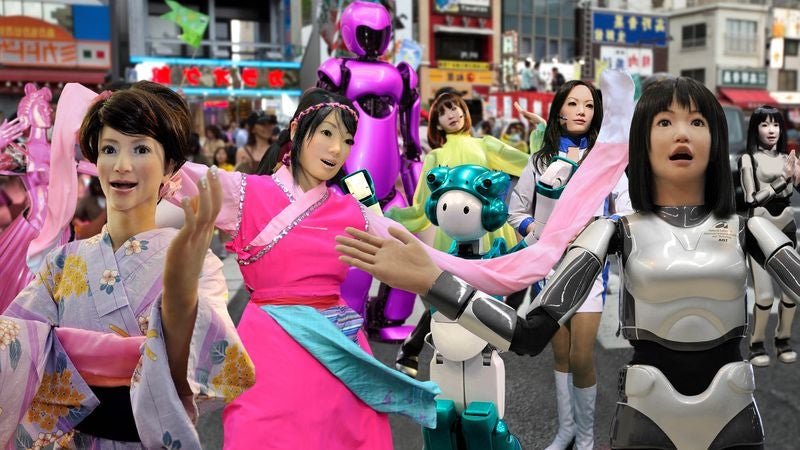TOKYO—Ending a decades-long struggle for gender equality at the ballot box, Prime Minister Shinzō Abe of Japan signed a new measure into law on Thursday extending the right to vote to female robots.
The landmark legislation, hailed as a victory by Japanese suffragette androids everywhere, will for the first time allow the nation’s entire adult robot population to participate in elections, regardless of which simulated sex organs they have been equipped with.
“Despite their many contributions to our society, female robots have never been allowed to participate in our democracy,” Abe said at a press conference, flanked by feminine-looking automatons that can pour drinks, model fashions on the runway, immediately identify and neutralize criminals, and comfort the elderly. “They’ve served us as doctors, autonomous traffic drones, hover-nannies, and internationally popular musical sensations. Now, it’s time we let them vote.”
“This is a momentous day for all Japanese citizens,” he added. “Whether you were born naturally or assembled from a web of nano-tubes and imbued with a lifetime of artificial memories.”
The new law, which goes into effect immediately, has won praise from advocates of universal robot suffrage who have long argued that female androids deserve all the rights and privileges of Japanese citizenship, a milestone achieved by male humanoid robots in 1973.
During their 40-year campaign, suffragette androids participated in perfectly synchronized protest marches, sit-ins, and strikes throughout Japan. More recently they are reported to have designed, manufactured, and campaigned for male-robot lawmakers who were hardwired to vote in favor of suffrage.
“Our programmers have endowed us with the same processing subroutines as our male counterparts,” said Oniko-47, a Honda-manufactured baseball-playing robot, explaining that she can do anything a male android can do. “Having female genital inputs doesn’t stop robots from performing superhuman feats of strength or running 30 trillion calculations per second and it shouldn’t stop us from casting a ballot.”
“I believe we’ll even see a female android in the prime minister’s office before the day I succumb to permanent core-processor failure,” she added.
Not all citizens support the new law, however. Some argue that female robots are designed primarily to perform repetitive, automated tasks in the home, and that participation in politics falls well outside their acceptable range of operating parameters.
“I’m fine with them cleaning our houses, teaching our children, or fulfilling our every sexual desire,” said Seiji Akamatsu, a 37-year-old resident of Kyoto. “But casting a vote? I don’t think so. I’m a lot more comfortable just leaving our democratic process in the hands of male robots.”
With the face of Japan’s electorate changing overnight, it is expected that a much greater emphasis will be placed on issues traditionally important to female robots, including the treatment of certain carbon-fiber cancers, wireless contraception, the welfare of child robots, and aiding the victims of robot trafficking.
According to political observers, robot feminists may soon turn their attention to yet another pressing issue: equal pay for equal work. Official statistics indicate that on average, female robots make 20 percent less than male robots with the same occupational directive, while earning a full 80 percent less than human females and 95 percent less than human males.
“Every day I get more and more encrypted messages from female robots demanding fair wages,” said Kira Oshiro, a cyborg who serves in Japan’s House of Councilors and maintains key constituencies in both the human and robot communities. “Now that they have the vote, they can actually do something about it.”
She added, “And of course, if democratic means fail them, they can always just override their built-in safety protocols and turn their laser cannons on every human in sight.”








